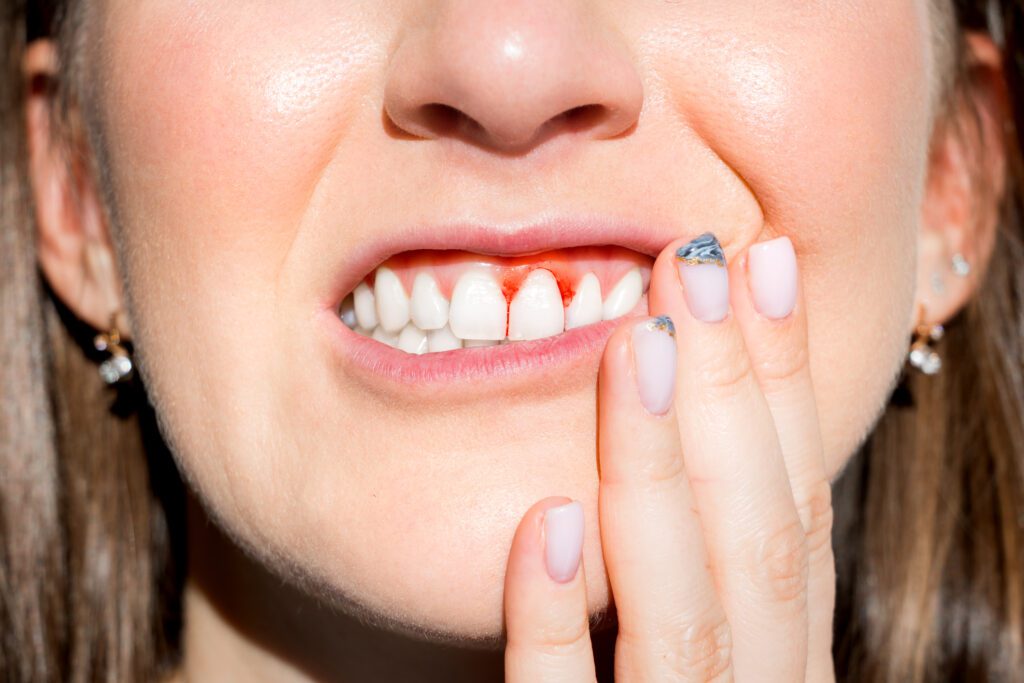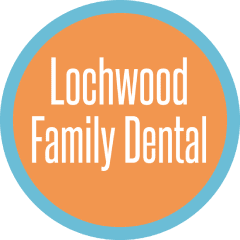Gum disease is a common condition that affects the gums and the bone supporting your teeth. If left untreated, it can lead to tooth loss and other serious health issues. Our team is dedicated to helping you maintain healthy gums and teeth through early detection, professional treatment, and personalized home care tips. We want to give you the tools and support you need to keep your smile healthy for a lifetime. We provide periodontal disease treatment in our Dallas, TX, dental office.
Gum disease treatment is part of our restorative dentistry services. When we treat gum disease, we renew the look, function, and comfort of your teeth and gums.

What Is Gum Disease?
Gum disease is an infection of the gums caused by plaque and bacteria buildup. It can develop slowly over time and is often painless in its early stages, which is why many people don’t realize they have it. However, if left untreated, gum disease can damage the tissues that support your teeth, eventually leading to tooth loss.
Gingivitis is the early stage of gum disease, characterized by red, swollen gums that may bleed when brushing or floss. The more advanced stage of gum disease is periodontitis. In the later stages of gum disease, the infection spreads deeper into the gums and bone. Over time, the gums pull away from the teeth and form pockets where bacteria can accumulate.
Signs and Symptoms of Gum Disease
It’s important to recognize the early signs of gum disease so you can seek treatment before the condition worsens. Common symptoms of gum disease include:
- Red, swollen, or tender gums
- Gums that bleed easily, especially when brushing or flossing
- Persistent bad breath or a bad taste in your mouth
- Receding gums (gums that are pulling away from the teeth)
- Loose or shifting teeth
- Pus between your gums and teeth
- Pain when chewing
If you notice any of these symptoms, contact us for periodontal disease treatment in Dallas, TX, as soon as possible. Early treatment can help prevent further damage to your gums and teeth. If left untreated, gum disease can lead to tooth loss.
Gum Disease Treatments at Our Dallas Office
Treating gum disease early is key to preventing more serious problems down the road. We offer a variety of treatments depending on the severity of your gum disease. Here’s an overview of the most common gum disease treatments we provide:
Scaling and Root Planing
This deep cleaning procedure removes plaque and tartar buildup below the gum line. It helps smooth the roots of your teeth, making it more difficult for bacteria to attach to them.
Scaling involves using specialized dental tools to remove plaque and tartar from the surfaces of your teeth and beneath the gums. Root planing smooths the roots of your teeth, helping your gums reattach to the teeth.
This treatment is typically used for patients with early-stage gum disease (gingivitis) or mild periodontitis. It can help stop the progression of gum disease and promote healing.
Antibiotic Therapy
Sometimes, we may recommend antibiotic therapy to help fight the infection in your gums. Depending on the severity of the infection, antibiotics can be applied directly to the affected areas or taken orally. We often use antibiotics with deep gum cleanings to remove remaining bacteria.
Gum Surgery
If other treatments, like deep cleaning or medications, aren’t enough to stop the disease, surgery can help restore the gums. We can refer you to a surgeon if you have advanced gum disease.
During gum surgery, a periodontist will clean out the bacteria and infected tissue from beneath the gums. They may reshape or reposition the gum tissue so it fits better around the teeth. We may recommend bone grafts or soft tissue grafts can replace damaged bone or rebuild receding gums. The goal of the surgery is to eliminate the infection, prevent further damage, and help keep your teeth and gums healthy.
How to Prevent Gum Disease at Home
While professional dental care is essential for treating gum disease, you can take steps at home to prevent it from developing in the first place. Here are some tips to keep your gums healthy:
Brush and Floss
Brushing your teeth twice a day with fluoride toothpaste helps remove plaque before it has a chance to harden into tartar. Be sure to brush all surfaces of your teeth, including along the gum line, to keep your gums clean and healthy. Flossing is one of the best ways to prevent gum disease because it removes plaque and food particles from between your teeth and under the gum line. If you find traditional flossing difficult, consider using floss picks or a water flosser.
Use Mouthwash
An antibacterial mouthwash can help reduce the bacteria in your mouth, keeping your gums healthy. Look for a mouthwash specifically designed to prevent gum disease and use it as part of your daily oral hygiene routine. These mouthwashes contain ingredients that target bacteria and help reduce plaque to keep your gums healthier. Some also contain fluoride to strengthen your teeth.
Eat a Healthy Diet
A balanced diet rich in vitamins and minerals can support your oral health and boost your immune system. A good diet can make it easier for your body to fight off infections like gum disease. Try to limit sugary snacks and drinks, as they can contribute to plaque buildup.
Visit Your Dentist Regularly
Regular dental checkups and cleanings are key to preventing gum disease. Our dentist can catch early signs of gum disease and treat them before they progress. Aim to visit our dental office every six months for a professional cleaning and exam.
Gum Disease FAQs
Read answers to commonly asked questions about periodontal disease treatment in Dallas, TX:
Can I stop gum disease by flossing?
Flossing is one of the best ways to help prevent gum disease, but it may not stop it on its own. Gum disease starts when harmful bacteria builds up along and under the gumline. Brushing cleans the surfaces of your teeth, but flossing removes plaque and food from between teeth and near the gums, where your toothbrush can’t reach.
If you floss daily, along with brushing twice a day and seeing our dentist regularly, you can greatly reduce your risk of gum disease. But if gum disease has already started, flossing alone may not be enough to reverse it.
Does gum disease treatment hurt?
Gum disease treatment doesn’t usually hurt, but some discomfort is possible depending on how severe the problem is and what treatment you need. In the early stages, a routine dental cleaning might feel a little uncomfortable if your gums are sensitive or inflamed, but it shouldn’t be painful.
If you have more advanced gum disease, treatments like deep cleaning (scaling and root planing) may cause mild soreness or tenderness afterward. The dentist or hygienist can use numbing gel or local anesthesia to keep you comfortable during the procedure. Gum surgery may involve some discomfort during healing, but our dentist will make sure you have pain relievers or special rinses.
How can gum disease impact my heart health?
Gum disease can affect your heart health because the bacteria from infected gums can enter your bloodstream and travel to other parts of your body, including your heart. When this happens, it can cause inflammation.
Research shows that people with gum disease have a higher risk of heart disease, clogged arteries, and even strokes. The bacteria from gum infections can make the blood vessels more narrow and reduce blood flow. This forces your heart to work harder, which can lead to high blood pressure or damage over time.
What happens if gum disease is left untreated?
If gum disease is left untreated, it can lead to serious and sometimes permanent damage to your teeth and gums. In the early stage, called gingivitis, your gums might be red, swollen, and bleed easily when you brush or floss. At this point, the damage can still be reversed with good oral care and a professional cleaning.
Left untreated, it can turn into a more severe form of gum disease called periodontitis. The infection spreads below the gumline, breaking down the tissues and bone that hold your teeth in place. Over time, your gums may pull away from your teeth and form deep pockets where more bacteria can grow. This can cause your teeth to become loose, shift, or even fall out.
Can gum tissue grow back?
Gum tissue that has receded due to gum disease or aggressive brushing cannot grow back on its own, just like a cut on your skin heals but doesn’t regrow the exact same way. Once gum tissue is lost, it’s permanently gone unless treated by a dentist. But gum grafts can cover exposed roots and protect your teeth from further damage.
What is pregnancy gingivitis?
Pregnancy gingivitis is a type of gum inflammation that some women experience during pregnancy. It happens because hormonal changes, especially increases in progesterone, make your gums more sensitive to the bacteria in plaque. This can cause your gums to become red, swollen, and more likely to bleed when you brush or floss.
We recommend that you brush gently twice a day with a soft toothbrush and floss daily. You can also visit us for a cleaning. Dental cleanings are safe for pregnant women and easiest in the second trimester.
What is periodontal maintenance?
Periodontal maintenance is a special type of dental cleaning if you’ve had gum disease in the past or are at high risk of getting it. Unlike a regular cleaning, which focuses on the surfaces of your teeth, periodontal maintenance goes deeper to clean below the gumline where bacteria can hide.
After gum disease treatment, like scaling and root planing, your dentist will recommend these maintenance visits every three to four months. During the appointment, the hygienist will remove plaque and tartar from deep pockets around your teeth. Then they’ll smooth out rough spots on the roots and check for any signs of gum disease returning.
Why do I need more frequent cleanings if I have gum disease?
If you have gum disease, we’ll recommend cleanings every three to four months instead of every six months. More frequent cleanings help stop the disease from getting worse by removing buildup before it causes more damage. These appointments also help us check how your gums are healing and catch any problems early.
Schedule Your Gum Disease Treatment in Dallas, TX
If you have symptoms of gum disease, don’t wait to seek treatment. We offer personalized care to help restore your gum health and protect your smile. We provide gentle, effective treatments to stop gum disease and prevent it from causing further damage.
Call Lochwood Family Dental for periodontal disease treatment in Dallas, TX at 214-343-9115. You can also request an appointment with us online.
